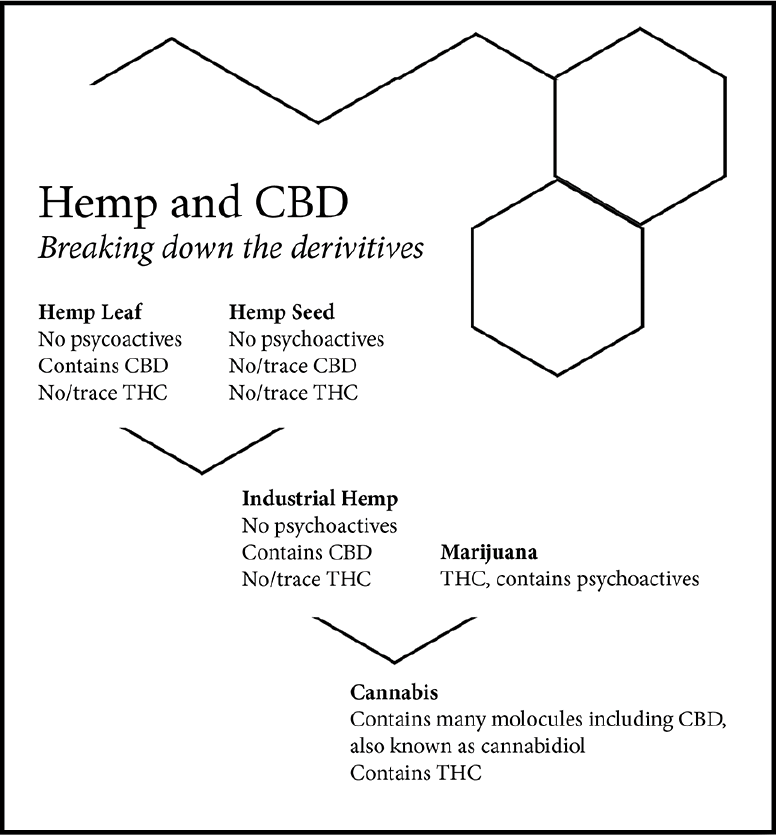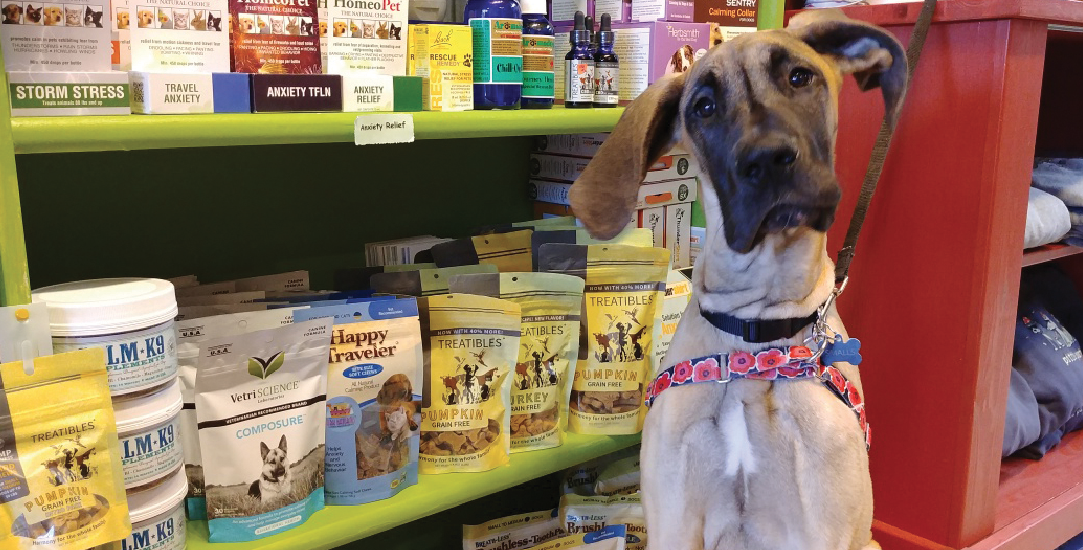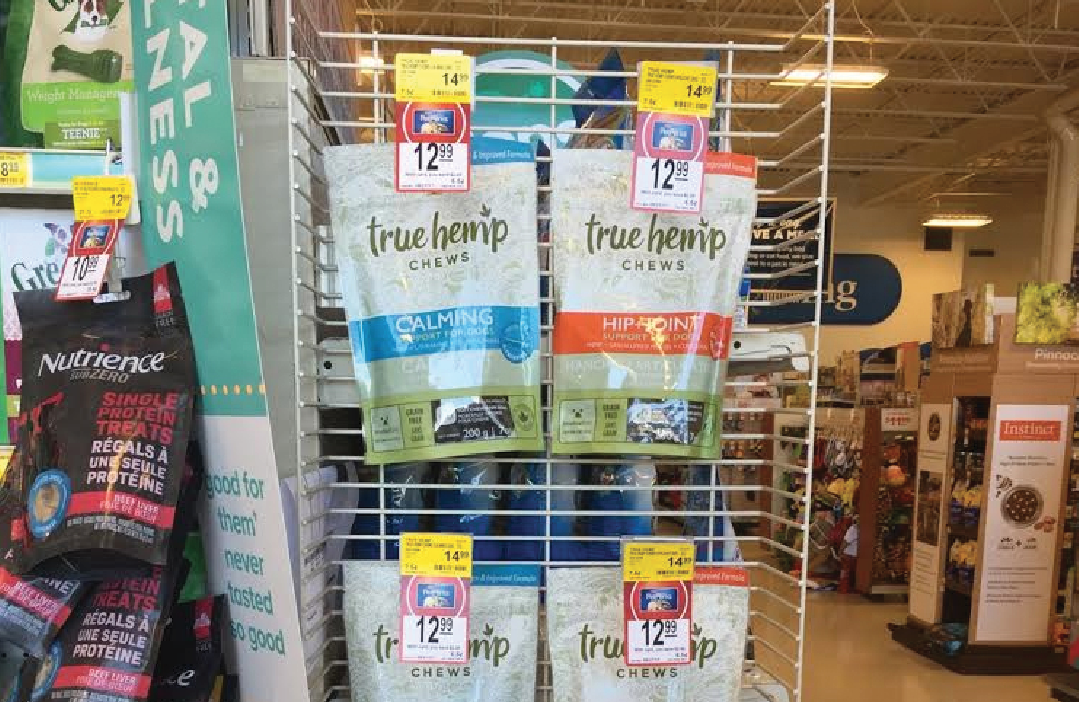FOR PET STORE OWNERS and manufacturers, the sale of cannabidiol (CBD) products continues to be a complicated and ever-changing issue. Two major changes are looming: the current fast-tracking of a bipartisan Senate bill to legalize hemp, a source of CBD, and the Federal Drug Administration’s likely June approval of a cannabis-based anti-seizure drug. If either or both become reality, the legalities and regulations pertaining to CBD products will change yet again — for the better, industry leaders say. Until that happens, here’s how to navigate sales of these products in your store.
Know the Benefits and Risks
 adie’s a dog with separation anxiety so intense that before she started getting drops of CBD oil, she’d eat through doors to escape the terror of being alone. These days she shakes a little, maybe whines, but her dramatic turnaround is the kind of story Carmen Alcalde tells customers when she’s talking about the effects of CBD she’s seen with her own eyes.
adie’s a dog with separation anxiety so intense that before she started getting drops of CBD oil, she’d eat through doors to escape the terror of being alone. These days she shakes a little, maybe whines, but her dramatic turnaround is the kind of story Carmen Alcalde tells customers when she’s talking about the effects of CBD she’s seen with her own eyes.
“We’ve heard some amazing stories from people who have truly have tried everything,” says Alcalde, co-owner of Bad Dog Frida in Madison, WI. Anecdotally, CBD products have positive effects on limps, seizures and thunderstorm freakouts. Customers asked Alcalde about bringing in CBD products while she was still researching the process, and once she did the store experienced swift and repeat sales.
Same for Valerie Rezente, category manager for Pet Food Express in Oakland, CA, a chain of 63 stores. The stores started stocking CBD oils and chews in 2017 to address ailments like inflammation, pain and anxiety.
Advertisement
“It has quickly grown to be our No. 1 remedy,” Rezente says. Many of the store’s staff members use CBD oil on their own pets, too.
Teresa Bues of Urban Dog Barkery has a different experience. Where she lives in Texas, officials often pull hemp and CBD products for violations like “invalid status,” “product registration” and “required labeling corrections.” When Bues tried to order CBD treats from a distributor, she was advised that Texas had been pulling the product from store shelves.
“The distributor had a letter on file that said, ‘You can sell these, but it doesn’t stop the state from telling you to pull it,’” Bues says. “The person that’s making everything be pulled didn’t get the memo [that the product is legal]. Who ends up paying for that? The retailer.”
Untangle the Legalities
 he long name for CBD is cannabidiol (can-a-bi-di-al), and it’s a cannabinoid (can-ah-bin-oid), a chemical compound that works with receptors in cells to trigger the brain’s neurotransmitters.
he long name for CBD is cannabidiol (can-a-bi-di-al), and it’s a cannabinoid (can-ah-bin-oid), a chemical compound that works with receptors in cells to trigger the brain’s neurotransmitters.
Advertisement
CBD is also a phytocannabinoid because it naturally occurs within the family of cannabis plants, and “phyto” indicates it’s from a plant. THC in marijuana is similar, but CBD is derived from hemp and doesn’t bring on psychoactive effects. CBD products are not medical marijuana, and the Hemp Industries Association maintains CBD products are legal to buy and sell in every state.
“Overall, we believe if it’s coming from a hemp-derived source, which is legal, if it’s produced by hemp farmers that are compliant with the Farm Bill in a state where it’s legal to grow hemp and then turn it into a commodity that can be marketed, then it should be considered legal,” says Colleen Keahey, executive director of the Hemp Industries Association.
When products are recalled, the legality of CBD isn’t always the reason. Utah, for example, pulled hemp products for pets based on a 2017 decision by the American Animal Feed Control Organization that hemp was not acceptable for pet food.
“They wanted to see the science, and the science had not yet been demonstrated to them,” Keahey says.
If you’re thinking about selling CBD products, ask other retailers and distributors if they’ve run into any red tape in your area, and get specifics about their experiences with your state’s laws regarding hemp and CBD products. Some retailers report great sales, but like Bues in Texas you risk a state agency removing products from your shelves. If you’re shipping products from your website, know that platforms like Shopify have adopted company policies to refuse payments on products with hemp and CBD ingredients.

Advertisement
Sell on the Science
 anufacturers aren’t allowed to make specific claims about what CBD can do, so most labels talk in terms of wellness rather than listing what it fixes.
anufacturers aren’t allowed to make specific claims about what CBD can do, so most labels talk in terms of wellness rather than listing what it fixes.
“When we talk about phytocannabinoid products, we talk about how they assist with calm and balance, and bring harmony to an animal’s system, as opposed to ‘This will help animal seizures’ or ‘This will take away your animals’ arthritis,’” says Julianna Carella, founder and CEO of Treatibles.
Her company offers weekly CBD online seminars for retailers on such topics as the science behind CBD, how the receptors in pets’ brains respond to phytocannabinoids, and how to sell their products based on science and research.
Companies like Treatibles and Canna-Pet focus on testimonials instead of promises, and lay out the way cannabinoid receptors work in a dog’s brain in charts and graphs. When you’re navigating through the junk products that have flooded the CBD market, look for companies that can answer your questions, and lay out the data for you in easy to understand ways.
Retailers should ask companies for information on what kinds of pesticides are used on the hemp plants used in their products, says Darcy Bomford, CEO of True Leaf Medicine International, which makes soft chews and oils are derived from the hemp seed, with no CBD component. If they can’t answer, think twice about buying. “It’s really important to know the company you’re buying the products from has done their homework,” he says.


True Hemp products hang near the pet food aisle, though the soft chews are considered to be supplements rather than treats.
Learn to Do the Math
 f you decide to sell CBD products, you might have customers who ask about dosing. It’s similar to recommended servings — match the amount recommended with the size of the dog.
f you decide to sell CBD products, you might have customers who ask about dosing. It’s similar to recommended servings — match the amount recommended with the size of the dog.
“The formula is on the label,” says Bomford. “It tells you exactly how much of each active ingredient is in each chew.” Companies doing their due diligence will include information on how much CBD is in each chew or supplement rather than a total of the whole bag or bottle.
Alcalde and her staff learned about dosing from the Treatibles seminar. “They really kind of relieved our worries about overdosing,” Alcalde said. “We approach it like we do with the homeopathic remedies. You can play with it and see what’s most effective.”
A Proactive Approach
When Nancy Guinn learned that the Virginia Department of Agriculture planned to visit her Dog Krazy stores to pull CBD treats from the shelves, she took a proactive approach.
Guinn got on Facebook and announced a CBD sale. It was April 20, after all, so the timing proved perfect! The representative found boxes still available at her Spotslyvania store, but the Fredericksburg store sold out.
“He can’t stop the sale of what I don’t have in stock,” she says, adding that she’ll keep the products off the store floor going forward and provide them only by request. “I refuse to not let dogs who need CBD not have it.”